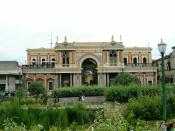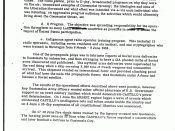The countries of Latin America have been characterized by political, social, and economic instability throughout the late 19th and 20th centuries. As military regimes continued to dictate with force and brutality and guerilla movements, revolutionaries and counterrevolutionaries amassed in power and number, speculation grew across the intellectual community. Why were the Latin American countries unable to protect and preserve democratic institutions? Although answers abound, such as economic dependency on foreign institutions and the pervading tendency of officials to corrupt, the answer is at least somewhat more singular in regards the Central American country of Guatemala. Cementing the United State's hypocritical policy of opposing socialistic, yet democratic governments, the CIA orchestrated coup d'etat of President Jacob Arbenz effectively ended a ten year period of political, economic, and social stability in Guatemala and directly inspired a civil war that spanned thirty six years.
The time period between 1944 and 1954 is often referred to as the "Ten Years of Spring" by the Guatemalan people, for the decade represented a period of relative prosperity and hope.
Presidents Juan Jose Arevalo and Jacobo Arbenz were both elected democratically on reformist platforms, ending the tyrannical reign of dictator Jorge Ubico (Perera, 40). Supported by the majority of the population, a rarity, Arevalo and Arbenz began to implement socialistic reforms in the early 1950s. Such reforms included the introduction of a social security program, expansion of rural education, and open elections (The United Fruit Company Instigates a Coup in Guatemala, June 18, 1954). Guatemala also enjoyed relative economic prosperity, bolstered by the stability of the nation. President Arbenz enacted the Agrarian Reform Act, also known as Decree 900, in 1952. (The United Fruit Company Instigates a Coup in Guatemala, June 18, 1954) The act addressed the extremely inequitable land distribution within Guatemala;...


